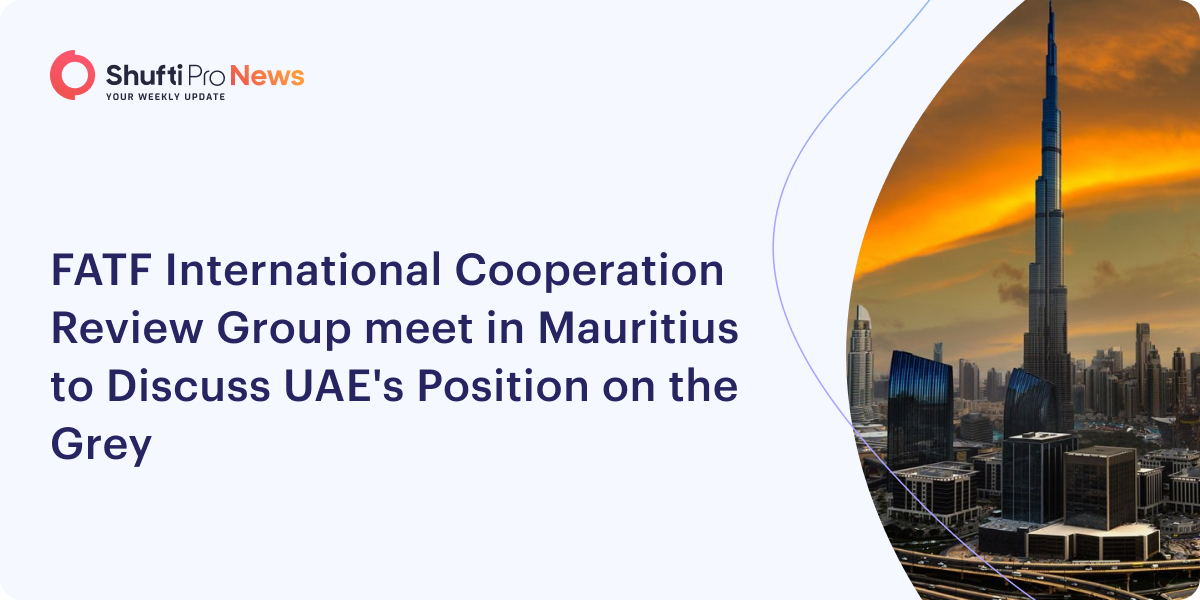FATF International Cooperation Review Group Meet in Mauritius to Discuss UAE’s Position on the Gray List

Despite ongoing financial crime, the US and several other Western countries have paid no heed to the UAE’s money laundering issues and have urged the watchdog to give the green signal to the UAE’s financial system.
As a result of persistent indications that the United Arab Emirates remains a haven for illicit transactions, several Western countries and the US are pushing for the creation of a global money-laundering watchdog that will evaluate the financial system in the country.
Against sanctions evasion, terrorist financing, and other crimes, the Paris-based watchdog FATF placed the UAE on its “grey list” in March 2022. Affecting the Middle East’s most prominent financial centre, the designation poses deep ramifications to its reputation and threatens to undermine the country’s long-term credit rating. The main reason for getting off it as soon as possible is the potential damage to UAE’s reputation as a business centre. Financial officials there have also promised to take “robust action.”
As part of the FATF’s International Cooperation Review Group (ICRG), which monitors the UAE’s progress, some members have expressed concern over the UAE’s information, which is used to assess its progress. They express concern, in particular, about the country’s overpromising and under-delivery of provided information.
Members of the ICRG from Germany, Italy, the EU, Greece, and the United States did not address the critics’ concerns. When ICRG members met in Mauritius in May, Michiel Vervloet, a Belgian representative, expressed opposition to the attempt to remove UAE’s name from the grey list even though the country has made only modest progress in preventing money laundering. After recently passing Belgium as the world’s largest trade hub of rough diamonds, international oversight officials suspect that much of the UAE’s trade involves illicit funds.
The meeting in Mauritius also saw a German delegate from the Finance Ministry explain that even if the information provided by the UAE is inaccurate, the body must make its determination based on that information. According to the UAE’s finance ministry, it did not respond to an inquiry regarding whether data provided to FATF had been manipulated. A few committee members expressed concern that the UAE still needed to follow FATF’s recommendations for fighting money laundering. However, representatives from other concerned authorities, including the Bank of Italy and the US Treasury, refused to comment.
Vervloet’s objections and those of other critics were ignored in the end. Bank of Italy’s official, Roberto Angeletti, believes the UAE should be removed from the grey list. There was no comment from Vervloet or Angeletti. There is no explanation for why the watchdog’s overseers have chosen to be more lenient with the UAE. UAE’s placement on the grey list last year may have shifted the geopolitical winds in its favour.
During a visit to Abu Dhabi in September, German Chancellor, Olaf Scholz, signed a gas deal to keep Germany warm during winter. He also announced a broader “Energy Security and Industry Accelerator Agreement between Germany and the UAE to enable the swift implementation of strategic lighthouse projects on the focus areas of renewable energies, hydrogen, LNG, and climate action.”
The United States, meanwhile, has been eager to emphasise to Saudi Arabia that it has other powerful Arab partners in the region, including the UAE, which has proved a problematic partner of late. There will be an update on UAE’s progress at the FATF plenary meeting in Paris this week.
Suggested Reads:
THE UAE AND MALTA ORGANISE A JOINT WORKSHOP TO SHARE AML/CFT KNOWLEDGE & EXPERIENCE
FATF URGES QATAR TO INCREASE ITS EFFORTS AGAINST MONEY LAUNDERING
ANTI-MONEY LAUNDERING LAWS REQUIRE NGOS TO DISCLOSE THEIR FUNDING SOURCES











